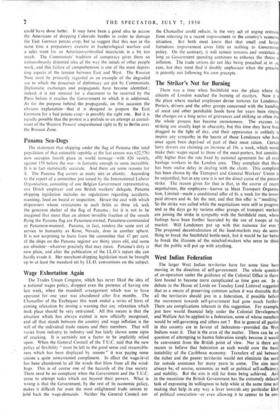Wage Exhortation Again
The Trades Union Congress, which has never liked the idea of a national wages policy, dropped even the pretence of having one last week, when the standstill arrangement which was to have operated for one year was abandoned after five months. The Chancellor of the Exchequer this week ended a series of hints of coming relaxation by issuing a warning that any relaxation which took place should be very restrained. All this means is that the situation which has always existed is now officially recognised, and all that stands between the country and wage inflation is the will of the individual trade unions and their members. That will varies from industry to industry and has lately shown some signs of cracking. It is certainly not a factor to be implicitly relied upon. When the General Council of the T.U.C. said that the new policy of flexibility " must be left to the good sense and reasonable- ness which has been displayed by unions " it was paying some unions a quite unwarranted compliment. In effect the wage-level has been abandoned to all the winds that blow from all the wind- bags. This is of course one of the hazards of the free society. There need be no complaint when the Government and the T.U.C. cease to attempt tasks which are beyond their powers. What is wrong is that the Government, by the rest of its economic policy, makes it difficult for even the most enlightened trade unions to hold back the wage-demands. Neither the General Council nor the Chancellor could refrain, in the very act of urging restrain from referring to a recent improvement in the country's econom situation. But both must know that that small and large fortuitous improvement owes little or nothing to Governmen policy. On the contrary, it will remain tenuous and uncertain long as Government spending continues to enhance the threat inflation. The trade unions do not like being preached at in an case, but they must find it doubly unpleasant when the preache is patently not following his own precepts.






































 Previous page
Previous page